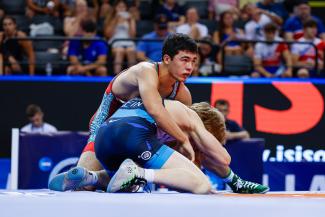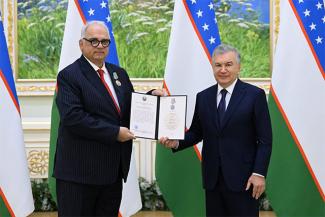Greece gets Greco finalist at U17 Worlds; Uzbekistan, Kyrgyzstan keep up
Tuesday, July 29, 2025 - 15:26 By Vinay Siwach

ATHENS, Greece (July 29) -- Uzbekistan and Kyrgyzstan continued their superb show in Greco-Roman at the World U17 Championships in Athens, Greece by earned two more spots in the finals.
On day one, the two countries, along with Georgia, were the only ones to enter multiple wrestlers in the final. On Tuesday, they added more while hosts Greece managed to enter one wrestler in the final, just the third-ever in Greco at World U17 Championships.
Asian U17 champion and returning bronze medalist at 71kg Behruzbek VALIEV (UZB) led the way for his country, reaching the final after beating returning silver medalist from 65kg Yusif AHMADLI (AZE), 9-5, in the semifinal.
Ahmadli raced to a 5-0 lead from par terre but Valiev scored two stepouts before the break to cut the lead to 5-2. He got par terre in the second but failed to score any points. However, another stepout made it 5-4. Valiev kept pushing the pace of the bout and managed an awkward throw for four points. Azerbaijan challenged in vain as Valiev got the win.
It is at this weight class that Greece will look to bag a gold medal as Dimitrios SOULIS (GRE) became just the third finalist for Greece at a World U17 Championships after he defeated Marlen MEIRBEKULY (KAZ), 9-8, in a thrilling semifinal.
Soulis led 8-4 with 10 seconds remaining in the bout when Meirbekuly hit a four-pointer to make it 8-8. However, Soulis had the criteria with a scoring action of four points, two points and two points while Meirbekuly had actions of one point, one point, two points and four points.
The second finalist for Uzbekistan came at 51kg after Otabek TURSUNOV (UZB) reversed the par terre and then scored four gut-wrenches to beat Polat KARADENIZ (TUR), 9-1, in the semifinals. He will face Hikmat HAGVERDIYEV (AZE) in the final who got a stepout with 18 seconds left against Asian U17 champion Islam KURBANOV (KGZ) to beat him 4-3 in the other semifinal.
Nurkerim KUMARBEKOV (KGZ) became the star for Kyrgyzstan as he surprised European champion Abdurrahman HUSEYNLI (AZE) with a big headlock throw for four points to start the semifinal. A lost challenge from Azerbaijan made it 5-0 for Kumarbekov.
With no passivity call in the second period, Kumarbekov kept his pace and Huseynli tried some desperate moves, getting for a takedown which gave Kumarbekov a 7-0 win.
It would have been an Kyrgyzstan-Iran final but Kuanyshbek ZHANGAZHOL (KAZ) had other ideas. He rallied from behind to beat Benyamin KHEZLI (IRI).
The Iranian took just 20 seconds to get on board with a takedown and turn that was only awarded after a challenge from Iran. He took a 4-0 lead against Kuanyshbek ZHANGAZHOL (KAZ) who used some solid arm-drags to score a stepout and then a takedown to cut it to 4-3.
As the time ran out, Zhangazhol dished out one more attack and got the headlock for four points. While Khezli got a counter turn, that was not enough for a win as Zhangazhol kept his 7-6 lead. Iran challenged the final move but it was a clear throw from Zhangazhol. The loss left Khezli in tears.
At 60kg, European bronze medalist Denys SEREDIN (UKR) suffered a heartbreaking loss in the semifinals as Amangeldi YSAKBAEV (KGZ) used a front headlock throw for four points with just 00:03 left on the clock to win 5-1 and earn a place in the final.
Seredin had defended well for the full match and was leading 1-1 on criteria but he let his guard down for the final five seconds of the bout.
Ysakbaev will take European silver medalist Ali NAZAROV (AZE) in the final after the Azerbaijani defeated Abolfazl ZARE (IRI) 1-1 in the other semifinal. Nazarov was winner based on the criteria that he scored the first point in an 1-1 scoreline match.
At 92kg, Kanstantsin KASYAN (UWW), who was seventh last year, booked a spot in the final this year after a 3-1 win over Ionut PATRU (ROU). Both wrestler got par terre positions but Patru was docked two points for headbutting in the second period which proved to be the difference between the two.
Winning the gold, however, will be a big ask for Kasyan as he faces Amirsam MOHAMMADI (IRI) in the final after he cleaned up Ahmet UZUN (TUR) 7-0 in the other semifinal.
RESULTS
45kg
GOLD: Nurkerim KUMARBEKOV (KGZ) vs. Kuanyshbek ZHANGAZHOL (KAZ)
SF 1: Nurkerim KUMARBEKOV (KGZ) df. Abdurrahman HUSEYNLI (AZE), 7-0
SF 2: Kuanyshbek ZHANGAZHOL (KAZ) df. Benyamin KHEZLI (IRI), 8-6
51kg
GOLD: Otabek TURSUNOV (UZB) vs. Hikmat HAGVERDIYEV (AZE)
SF 1: Hikmat HAGVERDIYEV (AZE) df. Islam KURBANOV (KGZ), 4-3
SF 2: Otabek TURSUNOV (UZB) df. Polat KARADENIZ (TUR), 10-1
60kg
GOLD: Ali NAZAROV (AZE) vs. Amangeldi YSAKBAEV (KGZ)
SF 1: Amangeldi YSAKBAEV (KGZ) df. Denys SEREDIN (UKR), 6-1
SF 2: Ali NAZAROV (AZE) df. Abolfazl ZARE (IRI), 1-1
71kg
GOLD: Behruzbek VALIEV (UZB) vs. Dimitrios SOULIS (GRE)
SF 1: Behruzbek VALIEV (UZB) df. Yusif AHMADLI (AZE), 9-5
SF 2: Dimitrios SOULIS (GRE) df. Marlen MEIRBEKULY (KAZ), 9-8
92kg
GOLD: Amirsam MOHAMMADI (IRI) vs. Kanstantsin KASYAN (UWW)
SF 1: Amirsam MOHAMMADI (IRI) df. Ahmet UZUN (TUR), 7-0
SF 2: Kanstantsin KASYAN (UWW) df. Ionut PATRU (ROU), 3-1


Share your thoughts.
Comments